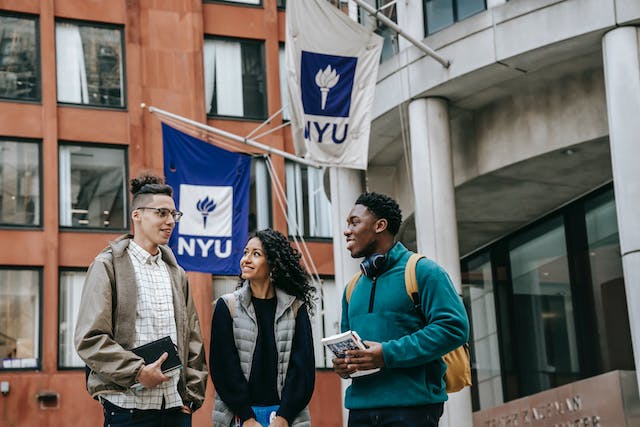1 Comprehensive US University Application Guide for Nigerians
Navigating the journey to study in the USA for Nigerians can be intricate and overwhelming. This US university application guide for Nigerians guide simplifies the process, offering essential insights into each step – from understanding O’level requirements to securing your student visa. It’s tailored for both undergraduate and postgraduate applicants, ensuring your path to a US university is clear and achievable.

Table of Contents
From O’level to Visa: Only US University Application Guide for Nigerians
Understanding O’Level Requirements for US Universities: For Nigerian students aspiring to study in the USA, the starting point is often their O’Level results.
Decoding O’Level Results for US University Admission
US universities typically require West African Senior School Certificate Examination (WASSCE) or National Examination Council (NECO) (website) results. The key is excellence; universities usually seek at least five credits in major subjects, including English and Mathematics. These results form the foundation of your academic qualifications, showcasing your readiness for university-level education.
Advanced Placement (AP) and International Baccalaureate (IB) Considerations
While O’Level results are crucial, pursuing AP or IB programs can provide an edge. These globally recognized programs may offer direct university credit, reducing the duration and cost of your study in the USA. They also demonstrate your ability to handle a more rigorous curriculum, a trait highly valued by US universities.

US University Application Guide for Nigerians: Language Requirements
English Proficiency Tests for Nigerian Applicants
Non-native English speakers, including Nigerians, must often prove their language proficiency. Tests like TOEFL or IELTS are standard requirements, with most universities looking for TOEFL scores of around 80 and IELTS scores of about 6.5. However, these benchmarks can vary, so checking specific requirements for each university or program is essential.
Waiver Options for English Proficiency Tests
In some cases, Nigerian students who have received their education in English might qualify for a waiver for these language tests. It’s essential to contact the admissions office of your chosen university to explore this possibility, as it can save time and resources.
Preparing for the US Standardized Tests
Standardized Tests for Admission
Most US universities require standardized test scores as part of the admission process. Undergraduate applicants may need to take the SAT or ACT, while postgraduate applicants might need the GRE, GMAT, LSAT, or MCAT, depending on the field of study.
Test Preparation Resources
Preparation for these tests is critical, and numerous resources are available, including online courses, practice tests, and study guides. Many educational organizations in Nigeria also offer preparatory classes for these exams.
Searching for Courses and Programs
Utilizing Online Platforms to Find US Universities and Programs
For Nigerians aiming to study in the USA, finding the right course and university is a significant step. Using online resources like EducationUSA and College Board is crucial. These platforms provide detailed information on universities, courses, rankings, and specific admission requirements, guiding you to make informed decisions.
Attending Education Fairs and University Webinars
Engaging in education fairs and university webinars is highly beneficial. These events offer direct interaction with university representatives, providing a deeper understanding of what each university can offer. They are platforms to ask specific questions and gain insights that are not always available online.
Application Process
The Common Application for Undergraduates
The Common Application is a streamlined platform many US universities use for undergraduate applications. It allows students to apply to multiple institutions simultaneously, saving time and effort. This unified application process requires careful completion, ensuring all necessary information and documents are accurately presented.
Graduate Application Procedures
This US University application guide for Nigerians is not complete without addressing the graduate admission process For postgraduate studies, the application process is more varied and often specific to the institution. Requirements typically include academic transcripts, recommendation letters, and standardized test scores like the GRE or GMAT. Each university’s website provides a detailed guide, requiring applicants to research thoroughly.
Scholarships and Financial Aid
Searching for Scholarships and Financial Aid
Financial considerations are crucial for Nigerians planning to study in the USA. Websites like Fastweb and Scholarships.com are invaluable resources, offering extensive databases of scholarships and financial aid available to international students.
University-Specific Scholarships
Many US universities offer scholarships specifically for international students, including Nigerians. These can significantly reduce the financial burden of studying abroad. Exploring each university’s financial aid page for such opportunities is crucial.
Crafting Winning Admission Essays and Statements of Purpose
Tips for Writing Impactful Admission Essays
Admission essays are your chance to stand out. They should reflect not only your academic abilities but also your personality, goals, and what makes you unique. Essays are a platform to express how you can contribute to the university’s community, emphasizing your potential beyond academics.
Crafting a Compelling Statement of Purpose for Graduate Studies
For postgraduate applicants, the statement of purpose is vital. It should articulate your academic and professional aspirations and how the specific program aligns with these goals. It’s an opportunity to demonstrate your commitment and suitability for the chosen field of study.
Key Factors in University Application
The Role of Extracurricular Activities and Work Experience
US universities often seek well-rounded individuals. Participation in extracurricular activities and relevant work experience can significantly enhance your application. These experiences demonstrate your skills, interests, and commitment beyond academic achievements.
Understanding Deadlines and Admission Cycles
Understanding and adhering to application deadlines is critical. For most universities, ‘Regular Decision’ deadlines fall in January, but options like ‘Early Decision’ or ‘Early Action’ have earlier deadlines. Planning is crucial to meet these timelines successfully.
Funding Your Education
Discuss options for funding education, including personal savings, educational loans, sponsorships, and part-time employment opportunities. A detailed discussion on this topic will be provided in an upcoming article.
The Visa Application Process
The most important final phase in the United States, US university application guide for Nigerians is securing a visa. Outline the basics of obtaining a student visa (F-1 Visa), including necessary documentation and interview preparation. A more detailed exploration of this process will follow in a subsequent article.
More Information on US University Application Guide for Nigerians
Understanding the US Education System
US Higher Education Overview: Before applying, it’s essential to understand the structure of the US education system. It consists of undergraduate (bachelor’s degrees) and postgraduate studies (master’s and doctoral degrees). Each level has specific requirements and durations. Undergraduate programs typically last four years, while master’s programs can range from one to two years, and doctoral programs can extend beyond that.
Community Colleges as a Pathway
Community colleges offer two-year associate degrees and can be a cost-effective pathway into the US education system. Many international students start at a community college and then transfer to a four-year university to complete their bachelor’s degree.
Financial Planning and Budgeting
Cost of Education
Studying in the USA can be expensive. Tuition fees vary widely depending on the type of institution (public vs. private) and the program of study. In addition to tuition, students should budget for living expenses, health insurance, books, and other personal expenses.
Financial Planning
Effective financial planning is essential. It involves not only securing funding through scholarships or loans but also managing living expenses wisely. Understanding the cost of living in different parts of the USA can help in budgeting and choosing the right university location.
Cultural Adjustment and Support Services
Adjusting to American Culture
Cultural adjustment is a significant aspect of studying abroad. American culture, including academic culture, can be quite different from what Nigerian students are used to. Universities often have international student offices that provide orientation and ongoing support to help with this transition.

Utilizing Campus Resources
Most US universities offer a range of support services, including academic advising, counseling, career services, and student clubs. Engaging with these resources can enhance the educational and social experience.
Work Opportunities and Practical Training
On-Campus Employment
International students in the USA on a student visa are usually allowed to work on campus for a limited number of hours per week. These jobs can provide financial support and valuable work experience.
Optional Practical Training (OPT) and Curricular Practical Training (CPT)
OPT and CPT are programs that allow international students to gain practical experience in their field of study. OPT can be undertaken after completing your degree, whereas CPT is part of the curriculum and can be done during the program.
Safety and Legal Considerations
Understanding Your Rights and Responsibilities
It’s crucial for international students to understand their rights and responsibilities in the USA. This includes adherence to laws and university policies, understanding the limitations of student visas, and being aware of the legal resources available to them.
Health Insurance and Healthcare
Healthcare in the USA can be expensive, and international students are typically required to have health insurance. Understanding how health insurance works and what it covers is crucial for managing health-related expenses.
Networking and Building Connections
Leveraging Alumni Networks
Many US universities have strong alum networks. Engaging with alumni can provide valuable insights, mentorship, and networking opportunities that can be beneficial during and after your studies.
Participating in Student Organizations and Events
Active participation in student organizations and events is an excellent way to build a network, develop skills, and adjust to life in the USA. It also enhances the overall study abroad experience by providing opportunities for cultural exchange and personal growth.
Conclusion
For Nigerians, the journey to study in the USA is a path filled with opportunities and challenges. This US university application guide for Nigerians provides a comprehensive overview, helping you navigate each step with confidence and clarity. Stay tuned for more detailed discussions on funding and visa applications.